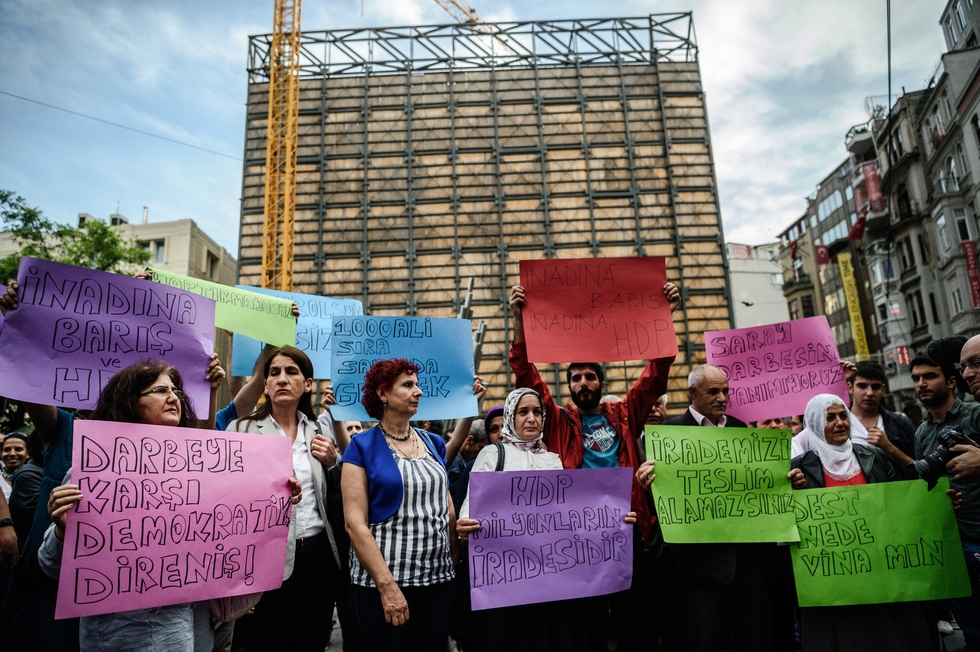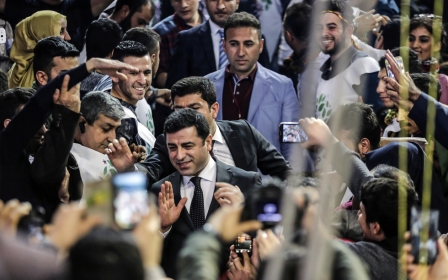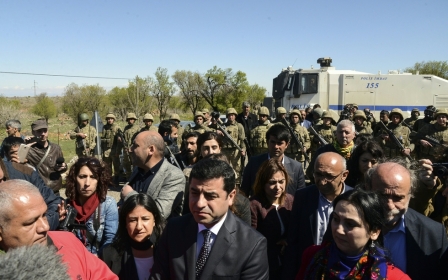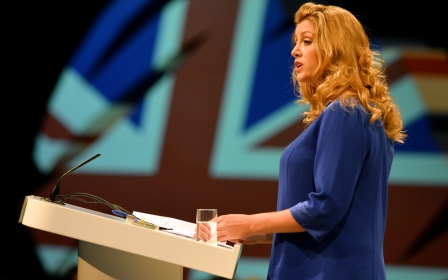Expulsion of pro-Kurd MPs will end peaceful integration in Turkey: HDP
Many predict breakdown of Peoples' Democracy Party could lead many Kurds and leftists to reject parliament

Supporters of People's Democracy Party hold placards reading: 'We do not accept palace coup,' and 'Democratic resistance against palace coup', during protest in Istanbul last week (AFP)
Published date: 27 May 2016 09:58 BST
|
Last update: 8 years 6 months ago
A vote last week to strip Turkish MPs of their immunity from prosecution has sparked a major outcry from deputies of the Peoples Democracy Party (HDP) and other leftist and pro-Kurdish activists.
At least 50 HDP members of parliament out of a total 59 are facing prosecution after an overwhelming majority of parliament agreed to strip MPs of immunity.
Ertugrul Kurkcu, the HDP’s honorary president, is one of those facing prosecution now that his immunity has been lifted.
“Personally, I have been charged 13 or 14 separate times - all of them for speeches in outdoor rallies or statements made in the media, which are a general repetition of what I’ve said in the parliament,” he told Middle East Eye.
He said that among the charges he was facing were “praising criminals, defaming the president, praising terrorist organisations” and “supporting irregular protest marches”.
“When brought before the European Court of Human Rights, all those indictments are going to be annulled of course, but this is not a matter of rule of law in Turkey, it’s a matter of criminalising your opponents,” he said.
Unlike the HDP’s core constituency, Kurkcu is an ethnic Turk and comes from a background of leftist activism. He spent 14 years in prison for taking up arms against Turkey’s military government in 1972. While doing his time, he translated Karl Marx’s biography into Turkish.
For Kurkcu, the closure of political parties has been a common theme during the history of the Turkish Republic - communists, leftists, Islamists, Kurds and others have all faced suppression by the country’s constitutional court.
Breaking point
But seeing the initial success the HDP had in the country’s southeast, Kurkcu sees the suppression of HDP lawmakers as a breaking point.
“If the HDP is ousted from parliament, or if the HDP is politically undermined and criminalised, it means the end of the Kurds’ peaceful and political integration into Turkey’s political system,” he said.
Anger at the ruling Justice and Development party (AKP) over the move is already palpable in Turkey, and many fear that Kurds and leftists will decide, as more radical activists have already concluded, that parliamentary democracy is a dead end for achieving social change.
“The Kurds are already reacting. In many places the youth and the political activists are calling on HDP deputies to leave parliament. There’s going to be a huge popular reaction - I don’t mean that people are going to go out on the streets for this, because they’re already out on the street protesting atrocities committed by the Turkish security forces."
Other parties in the parliament have members facing prosecution for a variety of crimes, ranging from corruption to insulting the presidency. Still, because most HDP parliamentarians face prison – and with scores of local politicians already deposed and imprisoned across the southeast – the party's future looks bleak.
AKP 'will use ban to seize bigger majority'
Once the constitutional amendment voted on in the parliament is signed into law, all outstanding dossiers on MPs will be sent to the judiciary within 15 days and, if the MPs are convicted, they will lose their seats and trigger by-elections.
"All this is aimed at pushing the party under the 10 percent threshold to enter parliament, which will allow the AKP to grab the seats the HDP normally would have taken," Kadri Gursel wrote on Al-Monitor.
"The ultimate objective is to ensure the AKP clinches a stronger parliamentary majority in a potential early election."
The HDP, in many ways, represents an anomaly in Middle Eastern politics. Apart from its support of the rights of Kurds and other ethnic minorities in Turkey, it has also campaigned for women’s rights, workers’ rights, LGBT rights and host of other issues regarded as controversial in religious, socially conservative communities.
HDP's decision to move away from ethnically focused politics and armed struggle of the Kurdistan Workers Party (PKK) also allowed it to attract a sizeable number of left-wing and socially liberal Turks as well.
For Serdar Baran, a 26-year old Kurdish student from the southeastern town of Mardin, the crackdown on the HDP reflects a tightening of political discourse in the country.
"Day by day, politics is getting worse in Turkey for the Kurdish public, and it is really getting harder to have an opinion about actual things," he told MEE.
"You don't know what will come out today and tomorrow, you can't imagine. Lets wait and see."
Mahir Yuksel, the 32-year-old owner of Café Zin in Diyarbakir, said the lifting of immunity is meant to "block voter's voices".
"We chose someone as our representatives. When the parliament blocks our will, they are blocking our choice," he said. "At the same time, our MPs have some responsibility to find a democratic way in a bad situation. The situation is getting worse."
Kurdish political parties have frequently faced closure in Turkey under charges of “separatism”.
The last Kurdish political party to be banned was the Democratic Society Party, which was liquidated in December 2009 by the Turkish constitutional court after being accused of being a "focal point of activities against the indivisible unity of the state, the country and the nation".
At the time, some politicians from the ruling AKP condemned the move.
"Turkey has become a graveyard for political parties that have been shut down,” said Mir Dengir Mehmet Firat, a Kurdish MP who defected to the HDP in 2015, despite having been one of the AKP’s founding members.
“Closing political parties does not bring any benefit to Turkey.”
Move could spark more conflict
Some analysts have also pointed out that the last time a move was made to remove immunity from Kurdish MPs, the next year saw the highest number of casualties ever in the PKK-Turkey war.
Others say the main reason the AKP and its allies in the judiciary have not pushed to ban the HDP is that it could undermine their own party's standing, which has itself been threatened with a ban for allegedly threatening the country's secularism.
“They changed the rules to make dissolution almost impossible after a case to dissolve their party went all the way up to the constitutional court and was rejected by only one vote in 2008,” analyst Ankarali Jan said.
“So this is their way of making sure that those who oppose them suffer without putting their own existence into question.”
Few doubt that suppression of the HDP will allow the more radical Kurdish and leftist activists - such as the Patriotic Revolutionary Youth Movement, the Revolutionary People's Liberation Party–Front and Civil Protection Units - to claim that their approach has been vindicated and that the AK-47, rather than the ballot box, is the way forward in Turkey.
"The state wants to break the opposition," said Yusuf Onal, 26, a news editor in Istanbul. "It does not help for peace. It is starting new conflicts."
"The government should have been more tolerant and the pro-Kurdish MPs should have been more careful and behaved more responsibly," said Tevfik Bayram, a 28-year-old resident of Sirnak.
Tensions between the HDP and the militants have long been apparent, despite the frequent accusations of collaboration by other political commentators.
“If [President] Tayyip Erdogan is expecting that once the HDP is eliminated, the Kurds are going to turn their faces to his party, this is not going to be the case - a desire for independence, a new wave of sentiment is going to grow within the Kurdish population in Turkey,” Kurkcu said.
New MEE newsletter: Jerusalem Dispatch
Sign up to get the latest insights and analysis on Israel-Palestine, alongside Turkey Unpacked and other MEE newsletters
Middle East Eye delivers independent and unrivalled coverage and analysis of the Middle East, North Africa and beyond. To learn more about republishing this content and the associated fees, please fill out this form. More about MEE can be found here.




